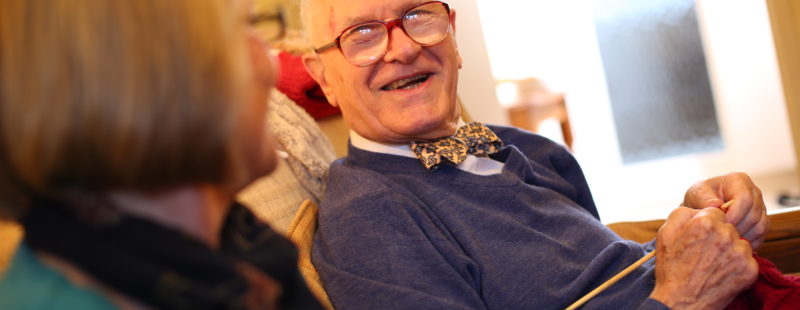Michelle Dawson, Programme Manager for Ageing Better in Middlesbrough reflects on how her organisation is responding to the new challenges of working on loneliness through lockdown, and what they are learning along the way.
The ‘too hard tray’
As the dust begins to settle from the frantic and very impressive response mobilised by our local authority (with help from the third sector) to meet people’s basic needs, I have had a bit of time to reflect on our learning from the last few weeks.
I could have written about any number of different things linked to loneliness and Covid-19. The massive leaps in partnership working to ‘get things done’ that otherwise would have taken months (if not years).
The resilience of the older people we speak to, who in the main are coping extremely well. How to set up a telephone befriending project in the space of a week. But one thing stands out to me more than anything else, and it’s to do with the sudden growth of the number of people in the ‘too hard tray’.
For the last five years Ageing Better Middlesbrough has been supporting people aged fifty plus to connect to each other, become less isolated and learn how to acknowledge, cope with and, in some cases, reduce their feelings of loneliness.
Middlesbrough is a very deprived place, and here, when we talk about loneliness we are also talking about complexity. People who have been in the ‘too hard tray’ of lots of different services for many years.
They may be housebound or living with mental health difficulties, physical health difficulties, sensory loss, caring responsibilities, no access to the internet, and living in poverty.
Their loneliness is tied up in a complex mix of long-term difficulties and physical or environmental barriers that can’t be changed or fixed. Stuff that is out of their control.
This all starts to sound quite familiar when we think about the current situation we find ourselves in as a community.
Now there are thousands more local older people with multiple and complex needs stuck behind their doors, and a worrying number have no access to the internet or digital devices. Suddenly everyone is in the ‘too hard tray’.
Reaching people
Big questions are being considered about what to do about the people that can now no longer be reached through traditional means (and by traditional I mean when we deliver everything in buildings and community centres and insist people come to us to access our services).
How do you deliver a public health campaign around exercise if the people you are targeting are not digitally connected and can’t leave the house?
How do we keep people feeling mentally well if they can’t join in things or attend a therapy appointment?
What if social prescribers can’t prescribe to community groups and community activity?
Will this finally be an end to our obsession with counting bums on seats and measuring our impact by the number of people who attended something or walked through the front door?
The big questions remain around how we support more people to become digitally connected.
If we are to spend the next year in and out of some form of lockdown, we need to act now, and there is no quick fix to supporting older people to learn how to use digital technology. Solutions require expertise, money and time.
“The current crisis has been everyday life for them for many years”
The reality is that for some of the loneliest people Ageing Better Middlesbrough has supported over the last five years, the current crisis has been everyday life for them for many years. Transport has always been off limits, community centres impossible, services inaccessible. And when it comes to supporting people to cope with feelings of loneliness in these circumstances, it gets hard.
Our learning suggests people need access to long term, therapeutic mental health intervention alongside practical help, to improve their wellbeing and feelings of loneliness when their lives are complex.
My hope is that a legacy of this pandemic will be a new benchmark for accessibility. That instead of measuring performance on the number of people who took part, we can also measure how well we did for the people who are the most excluded.
Everything we do as a sector from now on should have to answer the question ‘how will we make this accessible for people in a lockdown?’ because for some of our most lonely people, life has always felt like lockdown.





No comments on this article yet. Please feel free to submit a comment below.
By submitting a comment you grant Campaign to End Loneliness a perpetual license to reproduce your words and name/web site in attribution. Inappropriate and irrelevant comments will be removed at an admin's discretion. Your email is used for verification purposes only, it will never be shared.